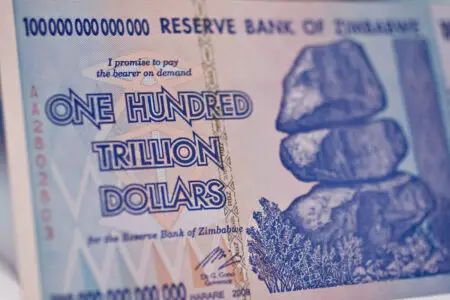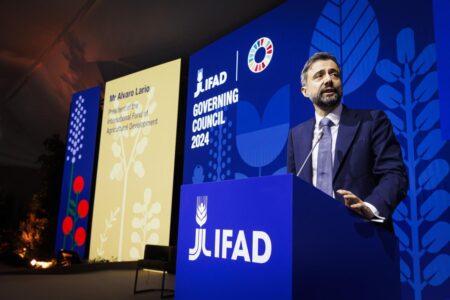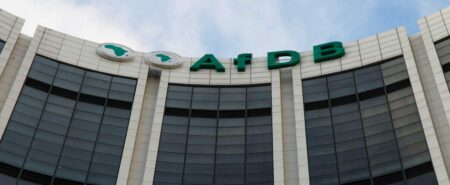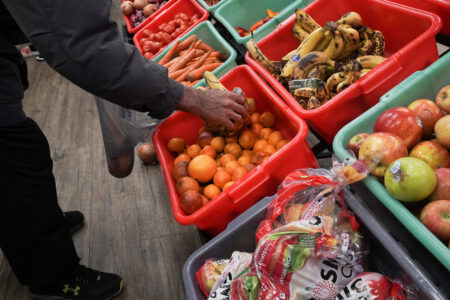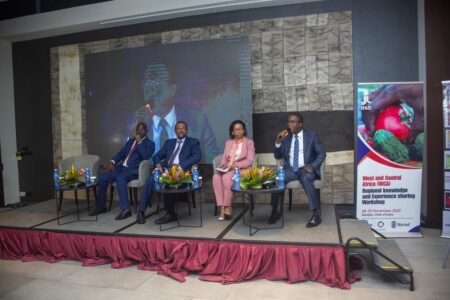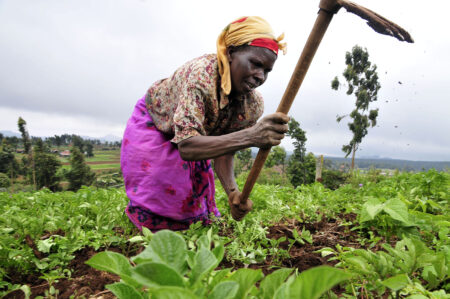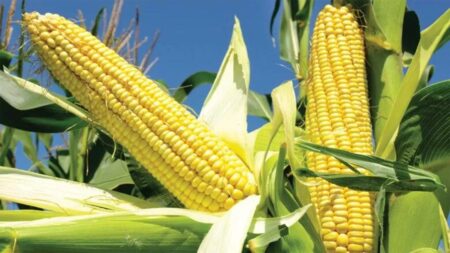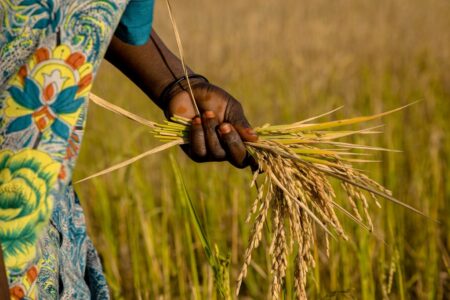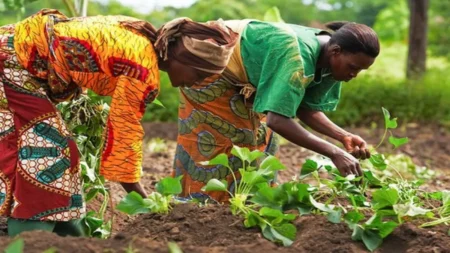- Africa’s new dawn: the rising role of digital and AI in agriculture
- Can Dangote Refinery Transform Africa Energy Ambition
- Gallup Survey: 80 per cent of Kenyan Workers Are Disengaged and Seek New Opportunities
- Madagascar Man Freed from 5KG Tumor After 15-Year Struggle
- How women in Africa are perceived and treated
- Sugar consumption in Kenya to Increase to 1.23 Million Tonnes
- Can Somalia and Turkey Oil deal Bring Change in Somaliland
- Remittances to Kenya dropped to $371.6 million in June, marking a six month low
Browsing: Food Security in Africa
- Zimbabwe is the worst hit in Africa with food inflation at 26% YoY, followed closely by Egypt at 18%, Malawi at 9%, and Guinea at 7%.
- The persistent weakness of the Zimbabwe dollar has been a driving force behind the steep price growth throughout 2023.
- Real food inflation, calculated as the difference between food inflation and overall inflation, provides a dire picture of the strain on households’ budgets in these countries.
The economies of Zimbabwe, Egypt, and Guinea are facing significant challenges due to soaring food inflation, placing them among the top 10 countries globally most affected by this roiling crisis.
According to the World Bank’s February 2024 update, Zimbabwe leads the pack in Africa, with food inflation at a staggering 26 per cent year-on-year, followed closely by Egypt at 18 per cent and Guinea at 7 per cent.
Real food inflation, calculated as the difference between food inflation …
- The transformative power of AI-powered innovation in empowering farmers with the tools and knowledge to protect their livelihoods and improve food security.
- Innovative solutions such as AI-powered climate information systems and blockchain technology for digital wallets are improving smallholder farmers’ productivity and driving their resilience.
- UN’s IFAD notes that innovation is not limited to cutting-edge technologies but can also be found in rural communities and among farmers themselves.
In Tanzania, AI-powered innovation is revolutionizing the agricultural industry, showcasing the immense potential of technology to drive resilience and productivity among smallholder farmers.
By leveraging an innovative app that analyzes images of pest-infected crops and provides locally available treatments, farmers have collectively saved an estimated US$100 million in lost crops.
This success story from Tanzania shared with the world during the International Fund for Agricultural Development (IFAD) 47th Governing Council in Rome, Italy, underscores the transformative power of AI-powered innovation in empowering …
- With 65% of the global uncultivated arable land located in Africa, AfDB says there is potential for the continent to feed itself and the rest of the world.
- The lender is now committing to focus on securing long-term financing for research activities and enhancing researcher CGIAR’s effectiveness across the continent.
- AfDB and CGIAR also anticipate engaging in capacity building for country-based national agricultural research services partners, young scientists, extension workers, and private-sector seed growers to produce certified seeds.
The African Development Bank Group (AfDB) and the Consortium of International Agricultural Research Centres (CGIAR) have committed to enhancing food security through improved production to offer better nutrition for Africa’s growing population.
This commitment involves strengthened collaboration between the parties, leveraging the robust arable land the continent possesses. “With 65 percent of the global uncultivated arable land, we believe that the continent can feed itself and the rest of the world,” AfDB …
- General cost of living in Africa has increased driven by food inflation.
- Researchers project a possible decline in food prices in 2024.
- Food security in Africa is threatened by possible escalation of conflict in Gaza.
The cost of living in Tanzania is steadily increasing, driven by the rise in the prices of basic foods. As of August 2022, Tanzania’s food inflation was reported at 7.8 per cent by the World Bank. The inflation rate worsened, reaching a peak of 9.7 per cent as of December 2022.
“This upward trajectory of food prices persisted into January 2023, where the food inflation rate reached 9.9 per cent,” reports Tanzania Investment and Consultant Group Ltd (TICGL), an economic research institute.
Food inflation is not only affecting East Africa but also most of the rest of the world. The World Bank states, “Inflation higher than 5per cent is experienced in 63.2 per cent of …
- IFAD together with governments, partners and stakeholders are exploring solutions to optimize the contribution of agriculture to nutrition in food systems.
- Africa still experiences a malnutrition burden among children aged under 5 years.
- The continent’s food security challenges are compounded by the war in Ukraine, by supply chain shortages, conflict, and drought.
A regional knowledge and experience-sharing workshop that addresses nutrition, rural development and food system transformation began today in Abidjan, Côte d’Ivoire. Improving food and nutrition security in West and Central Africa (WCA) is crucial. It is estimated that 29.8 per cent of the population of West Africa and 13.9 per cent of the population of Central Africa are undernourished.
For three days, representatives of rural development projects co-financed by the International Fund for Agricultural Development (IFAD) together with governments, partners and other stakeholders will explore solutions to optimize the contribution of agriculture to nutrition in the context …
The insurance sector has progressively curated products to cushion the different aspects of living, individuals and corporations. As such, agricultural insurance has been identified as an essential tool in assisting farmers, herders, and governments to mitigate some negative financial impacts of adverse natural events. Many countries have used insurance to help manage agricultural risks. The usefulness of agricultural insurance in risk mitigation is not in question.…
- World hunger is not the result of food shortage, and opposition to gene-edited crops, but due to political strife.
- Global food production is sufficient to feed all, but skewed distribution systems create a huge shortfall in countries.
- Analysis shows that even if GMOs were adopted globally, food shortage will persist.
Globally, Genetically Modified (GM) crops have been touted as the magic wand that could end world hunger. The ability of gene-edited crops to produce more over shorter periods of time and their resistance to diseases has been lauded. Further, GMO’s ability to resist poor weather conditions occasioned by climate crisis are earning them acceptance across nations.
These traits make Genetically Modified Organisms (GMOs) a solution to global food shortage. Increasingly, naturally maturing crops are yielding little, and their long gestation periods leave them vulnerable to climate crisis. Further their vulnerability to pests and diseases drastically cuts yields, exacerbating food shortages.…
- Nigeria has commissioned the large-scale Integrated Rice Mill to expand domestic rice production and achieve self-sufficiency.
- President Muhammadu Buhari says the move is in line with his government’s mandate to achieve food security and boost incomes.
- Nigeria is the largest producer of rice in Africa, producing about 8.44 million tonnes annually. It is followed by Egypt, Madagascar, Tanzania and Mali.
Nigeria has commissioned the large scale integrated rice mill as the West African country expands domestic rice production to achieve food security and boost incomes for millions of farmers.
President Muhammadu Buhari said the move aligns with his government’s objective of achieving food security and enhancing rice value chain. The new rice mill is located in Sheda, Kwali Area Council, within Abuja.
“We have witnessed the rapid increase in domestic rice production from the incentives given to farmers and processors over the period as a resolution of leveraging our potentials, …
- This partnership will allow OCP Africa scale its Digital Agriculture Platform.
- In 2021, Agriculture accounted for 17.2% of Africa’s total revenue.
- Smallholder farmers estimate a loss of at least 15% of their entire yield during the food production process.
Microsoft has announced its partnership with OCP Africa through its Africa Transformation Office to improve Africa’s food security and Agritech at the 5th United Nations Conference on the Least Developed Countries. The partnership will assist smallholder farmers increase agricultural production through Agritech.
OCP Africa is an agricultural company that supplies fertilizer solutions adapted to local conditions. The company has built a reputation with its initiative to support small-scale farmers within the continents.
With Africa’s recent technological investments, more industries are incorporating technology to increase efficiency, boost performance and prevent any damage. Agritech is one of the few revolutionary concepts Africa has eagerly adopted over the past decade. This new collaboration will …
Idris Elba and Sabrina Dhowre Elba were honoured with the 2023 Crystal Award at the World Economic Forum in Davos for their leadership in advocating for poor small-scale farmers worldwide. The Crystal Award recognizes exceptional artists and cultural leaders whose contributions to society have made a tangible impact on improving the state of the world.
As Goodwill Ambassadors for the United Nations’ International Fund for Agricultural Development (IFAD) since 2020, the Elbas have been vocal supporters of greater investment in agriculture and rural development, particularly in Africa, where severe weather events and conflicts have further impacted farmers’ ability to produce food for their families, communities, and countries. Despite the vital role these farmers play in ensuring global food security, 75 percent of the world’s hungry and poorest people live in rural areas of developing countries.
The Importance of Small-Scale Farmers in Africa
Small-scale farmers play a vital role in feeding …





